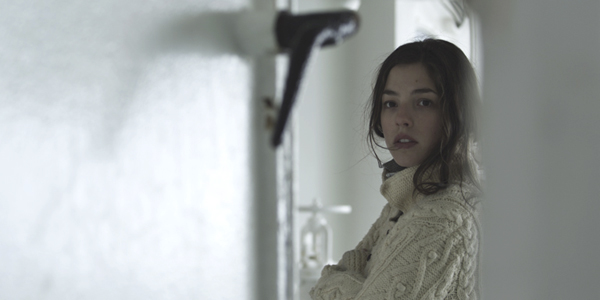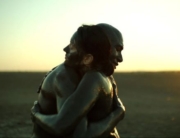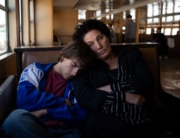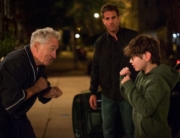At the end of Red Knot, director Scott Cohen dedicates the film to his wife. It’s a personal touch to what feels like a very personal film. Its core love story focuses on the emotional roller coaster of a young married couple. Their story is supposed to anchor the film, though I found myself more concerned with the amazing landscape shots.
The title is also the name of the hardy research vessel in which young couple Chloe and Peter (Olivia Thirlby and Vincent Kartheiser) aboard in the beginning. It’s bound for a long trip around Antarctica. On board are real-life whale biologist Roger Payne (playing himself) and his wife, actress Lisa Harrow (appearing as herself). At first, Chloe and Peter are overjoyed at this adventure. They chuckle at their crappy lodgings; this is by no means a luxury cruise. They take advantage of the trip, escaping whenever they can to spend time alone in their cabin.
Peter is particularly enamored of his surroundings, having been inspired by explorers like Robert Falcon Scott and Ernest Shackleton. As a writer, he spends every moment he can with Payne and waxing poetic about the life of an explorer. Eventually, Chloe begins to feel left out, as she isn’t quite as excited to spend all her time sucking up to famous researchers. She becomes lonely and homesick as Peter often leaves her behind to speak with Payne.
When Lisa mentions to her that Peter has a book deal that will entail him to continue traveling to the South and North Poles, Chloe is enraged. Peter never ran this extensive trip by her, and the thought of her being left alone for an extended period of time is the final straw. She immediately asks the boat captain, Emerson (Billy Campbell), for another cabin. He obliges, probably because he’s been creepily watching Chloe from afar as soon as she boarded. They develop a close friendship as Chloe thrives away from Peter. She begins to interact with other shipmates and work on her art. Peter, though, is devastated by her decision to move out of their cabin.
What is left out of that description is how much is devoted to beautiful shots of the Antarctica landscape and its animals. The natural world is meant to demonstrate the wildness of Chloe and Peter’s relationship, though against this backdrop, it was hard to feel too badly for them. Kartheiser, as the arrogant creep Pete Campbell, is a favorite from Mad Men. Unfortunately, he is as big a jerk here, too, though without the subtly beautiful characterization of Campbell. He treats Chloe so horribly it’s hard to imagine they ever decided to get married. Thirlby, on the other hand, gives an effective performance, having to carry most of the film. As a wife who’s been emotionally abandoned by her husband, she manages to reveal a triumphant change in leaving him and taking care of herself.
Aside from the impressive natural scenery, the film touches on some interesting concepts concerning gender. Chloe points out early on that most explorers are men, and Payne humorously notes that it’s because men need to own and collect natural things. Peter’s egotistical obsession with exploring follows through with this line of thought: that men will explore the darkest corners of the earth, even if it kills them and their relationships. While this theme sort of follows through to the end, Red Knot brings up more complicated ideas that could have made it more compelling if developed further. There’s a lot in Red Knot to like, but I wish those matters would have moved more to the forefront.







Leave A Comment